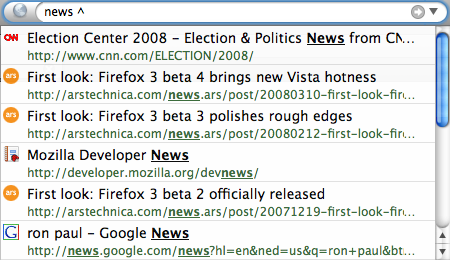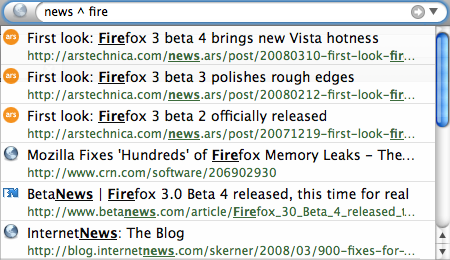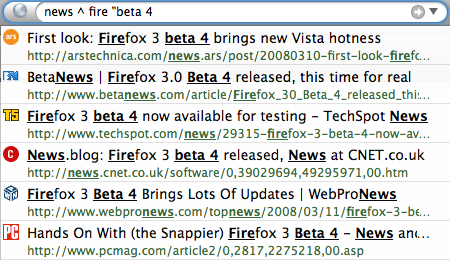8 April 2008 - 8:53Awesomeness in Beta 5
I’ve been busy preparing for a conference talk, so I didn’t get around to reporting AwesomeBar improvements for Beta 5 sooner. (But for those curious, I presented Branch-on-Random [pdf, uiuc.edu] at CGO 2008 [cgo.org] (Code Generation and Optimization). Basically, it’s an instruction that’s really cheap to implement and allows for a factor of 10 times less overhead than traditional sampling techniques. I think it went well, and I even got asked during Q&A.. “When can I buy one of these?” 🙂 )
As we’re winding down to ship Firefox 3, there aren’t as many more big features, but there’s still some useful changes in Beta 5 in terms of functionality, display, and performance. So those of you who have installed extensions to make the auto-complete smaller might want to turn it off to try out the new look.
Functionality
To better accommodate people’s expectations of results in the auto-complete, there are frecency tweaks to better prefer pages you’ve typed — by default, before adaptive learning. This helps address concerns that the top level site’s main page should appear high in the list because typically people are typing in the domain.
Another common complaint is that results seemed to be returning useless results when typing 1-2 characters. This stemmed from results being matched in the middle of words instead of at the start of the domain, for example. The adaptive learning helps avoid this problem because you’re typing words and selecting results that matched the word you wanted. The learning system then knows to show that selected page over others when you just type a single letter of the word — effectively showing a result that matches at the beginning of the word.
So to improve things for Beta 5, words that you type in the location bar will try to match on word boundaries e.g., matching after a forward slash or space. This even works for CamelCase (capitalizing the first letter of words instead of putting spaces) which is common for wikis.
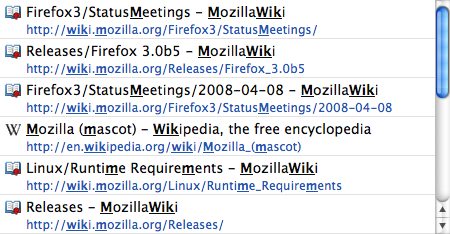
Display
The first thing people will probably notice is that the list doesn’t feel as overpowering anymore. The number of results shown on the screen has been reduced to 6. Additionally the font size of the title text is smaller which felt unnecessarily large on some platforms like OS X. Ideally, the fewer number of results will help users scan results quickly instead of feeling overwhelmed. Combined with better functionality of multi-word search, adaptive learning, and word boundary matching, finding the page you want should be a happy experience. 🙂
Another set of changes is for how words you type get emphasized. Instead of only showing the first match in the title and url, it’ll emphasize all matches. Additionally, it’ll show matches when you type multiple words as well, so each word gets emphasized instead of nothing at all. For browser skin designers, there’s a new css class to alternatively emphasize matches, but the main purpose is to avoid styling bold which breaks common ligatures in some languages.

Performance
There has been improvements in browser responsiveness in Beta 5, so now it no longer eats up all of your CPU power for every letter that you type. In Beta 4, every single letter you typed caused the browser to start searching through your whole history
To optimize for users typing letters one by one for a whole word, we now reuse the results that are currently being shown in the list as well as continuing the search from where the last one left off. This has 2 main effects outside of reduced CPU usage: 1) existing matching results show up immediately instead of disappearing momentarily then reappearing and 2) not-as-frecently visited results can be found faster as you continue to type.
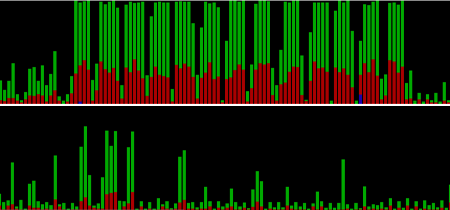
The picture shows a CPU usage graph where high bars means the CPU is doing a lot of work (and potentially not letting it update the UI). The horizontal axis is time and each set of 5 bars shows the 5 seconds after typing a letter one by one. So comparing the two graphs, we find the same results with a lot less work.
As an informal poll, I was wondering how many people are using the unofficial tryserver builds that I’ve been making. There’s some features like showing keyword searches, restricting searches, etc., that might not make it into Firefox 3 final, but I could potentially start a build near ship time, so you can get Firefox 3 + some extra awesomeness.
15 Comments | Tags: AwesomeBar, Conference, Mozilla

